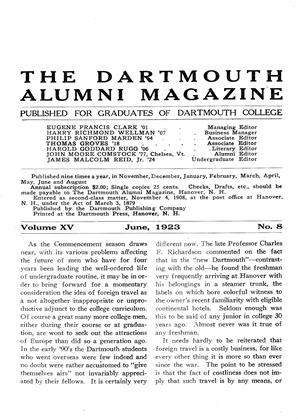The New Republic of May 2 was of particular interest to Dartmouth men by reason Of Arthur Gleason's extended interview with President Hopkins, a statement of the educational aims and entrance qualifications in force at the College.
"It is a loose American formula, " President Hopkins is quoted as saying, "that everybody has a right to a college education whether he can absorb it or not We wish an aristocracy of brains in our college group. By this we mean intellect and personal attributes and moral fibre. We hold that the development of mind without morality is usually detrimental to society. And we hold that the correct use and aim of acquisition are not netted by anything so crude as examination papers.... Too many men are going to college. This is not to say - it is the opposite of saying— that too many men are seeking an education. It is impossible that too many men should seek an education. But a lot of those now entering college should go to technical schools. A lot more should go to vocational schools The future work of the man is not the test of whether he should go to college. The test is the individual, the kind of mind he carries.... The function of the college is to stand for breadth of interest, for pioneer work, rather than for high specialization."
This explanation of the aims of Dartmouth and the methods by which the College hopes to achieve them is one that President Hopkins has given often to Dartmouth alumni. The interview in The New Republic, is, however, so clear and complete that the ALUMNI MAGAZINE has quoted from it concerning some of the special points most often asked about and least often understood.
 View Full Issue
View Full Issue
More From This Issue
-
 Article
ArticleTHE ANNUAL MEETING OF THE SECRETARIES, APRIL 27 AND 28
June 1923 By E. M. STEVENS '01, J. W. WORTHEN '09, C. E. SNOW '121 more ... -
 Sports
SportsBASEBALL
June 1923 -
 Article
ArticleAs the Commencement season draws near,
June 1923 -
 Class Notes
Class NotesCLASS OF 1911
June 1923 By Nathaniel G. Burleigh -
 Class Notes
Class NotesCLASS OF 1911
June 1923 By Nathaniel G. Burleigh -
 Article
ArticleTHE COLLEGE AND THE RIVER
June 1923 By JOHN KING LORD '68







